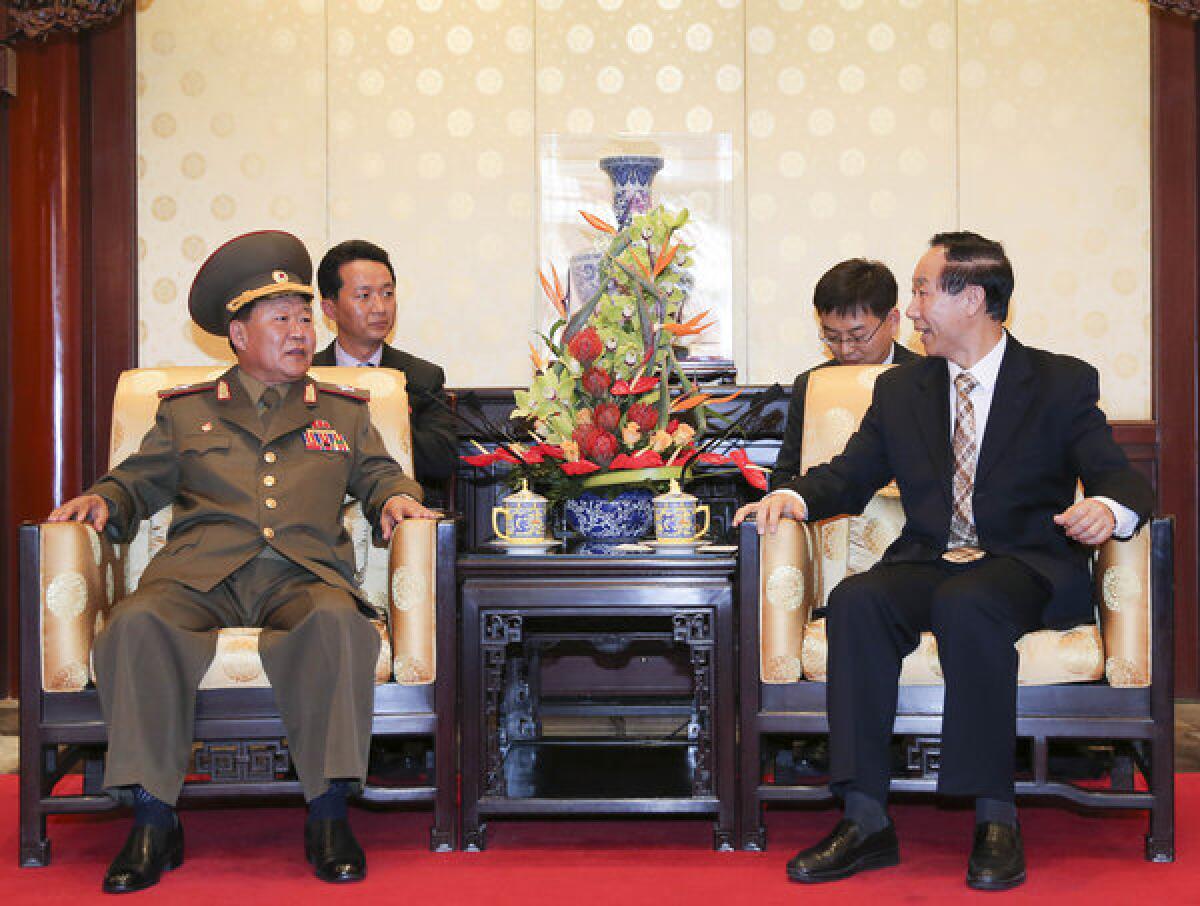North Korean leader Kim Jong Un sends envoy to China

- Share via
PYONGYANG, North Korea — After months of ignoring Chinese warnings to give up nuclear weapons, North Korean leader Kim Jong Un sent a high-level confidant to Beijing on Wednesday, in a possible effort to mend strained ties with his country’s most important ally and a sign that he may be giving diplomacy a chance.
The trip by Vice Marshal Choe Ryong Hae, a senior Workers’ Party official and the military’s top political officer, is taking place as tensions ease somewhat on the Korean Peninsula after near-daily vows from Pyongyang to attack Washington and Seoul in March and April.
The United States, Japan, South Korea, China and Russia have been busy discussing how best to engage with the North Koreans. Japan sent an envoy to North Korea last week to discuss decades-old abductions of its citizens, a move that has drawn concern among allies of Tokyo who want denuclearization to be the focus of talks.
Choe’s visit is the first this year by a top North Korean official to China, which is under pressure from the U.S. and others to rein in its belligerent neighbor. It’s also the first since a change of leadership in Beijing, whose new leaders have demonstrated a willingness to work with Washington to harry Pyongyang over its nuclear weapons programs even as stability in North Korea remains the Chinese government’s priority.
North Korea also revealed Wednesday that a former defense minister, Kim Kyok Sik, was promoted to chief of the Korean People’s Army in the latest in a series of high-level military reshuffles as Kim Jong Un elevates a new generation of military leaders.
Foreign analysts see Choe’s trip as part fence-mending mission, part appeal for aid.
The last high-level North Korea-China meeting took place when Chinese Communist Party chief Xi Jinping sent a Politburo member to Pyongyang in November. Weeks later, North Korea launched a long-range rocket, followed by an underground nuclear test in February. That test, the country’s third, drew tightened sanctions by the U.N. and United States.
Showing its displeasure with North Korea, China has tightened inspections on cross-border trade and its state banks have halted business with North Korea’s Foreign Trade Bank — signs that Beijing is getting serious about enforcing sanctions.
“The North Korean side has been feeling China’s pressure,” said Ma Xiaojun, a North Korea watcher at the Central Party School, a think tank for the leadership in Beijing.
“Our policies and stance have tended to be tougher and more clearly express our unhappiness and displeasure,” said Ma. He added, quoting President Xi, “causing trouble on China’s doorstep is not right, and China will not tolerate it.”
Choe’s priority is to mend ties, Ma said. Immediately upon landing in Beijing, Choe went to see Wang Jiarui, head of the Chinese leadership’s international affairs office and long the point man for China’s dealings with Pyongyang.
China is impoverished North Korea’s economic and diplomatic lifeline, providing nearly all of its fuel and most of its trade.
Chinese Foreign Ministry spokesman Hong Lei reiterated Wednesday that Beijing is committed to seeing North Korea denuclearize while maintaining regional stability — a catchphrase for continued Chinese support for Pyongyang.
ALSO:
European leaders take on corporate tax avoidance
Afghan security concerns to ease after 2014, Karzai says
Iran presidential vote: Who’s in? Who’s out? Who cares?
More to Read
Sign up for Essential California
The most important California stories and recommendations in your inbox every morning.
You may occasionally receive promotional content from the Los Angeles Times.










